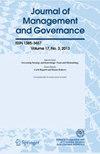Looking for missing outcomes: accounting for intellectual capital and value creation in ecosystems
IF 4
Q2 MANAGEMENT
引用次数: 0
Abstract
Abstract This article investigates intellectual capital (IC) and value creation at an ecosystem level, which is a topic relatively unexplored within public administration. Yet, public sector organisations are a prime example of how IC transcends the scope of individual entities and contributes to knowledge transfer and value creation into wider society. The research was developed within the first step of an interventionist research project focusing on a public sector agency which supports local authorities in Italy and launched an in-depth review of its processes to assess in how far it was fulfilling its mission. Part of this initiative was to assess whether, how, and to what extent the agency creates value for itself and for its stakeholders. The research develops a framework which visualises the importance of accounting for outcomes which are both internal and external to an organisation. The analysis underlines the need for reporting frameworks to consider the overall value creation, maintenance, and erosion. The analysis moves beyond the outcomes of activities and outputs for a single entity to appreciate their impact on its stakeholders’ IC. Results call for the emergence of defined roles for IC management and for the adoption of an ecosystem perspective in governance, business, and reporting models for the public sector. Public managers should adopt a business case imperative with a particular emphasis on maximising value creation for the whole ecosystem. IC visual maps including key stakeholders can help in such endeavour and improve reporting frameworks.寻找缺失的结果:计算生态系统中的智力资本和价值创造
摘要本文从生态系统层面对智力资本与价值创造进行了研究,这是公共管理领域一个相对未被探索的课题。然而,公共部门组织是IC如何超越个体实体的范围并为更广泛的社会的知识转移和价值创造做出贡献的一个主要例子。这项研究是在一个干预研究项目的第一步开展的,该项目的重点是一个公共部门机构,该机构支持意大利地方当局,并对其进程进行了深入审查,以评估它在多大程度上履行了其使命。这一举措的一部分是评估机构是否、如何以及在多大程度上为自己及其利益相关者创造价值。该研究开发了一个框架,该框架可视化了对组织内部和外部结果的会计重要性。分析强调了报告框架的需要,以考虑整体价值的创造、维护和侵蚀。该分析超越了单个实体的活动和产出的结果,以评估其对利益相关者的IC的影响。结果要求IC管理出现明确的角色,并在公共部门的治理、业务和报告模型中采用生态系统视角。公共管理者应该采用商业案例,特别强调为整个生态系统创造最大化的价值。包括主要利益攸关方在内的IC可视化地图可以帮助开展这方面的工作并改进报告框架。
本文章由计算机程序翻译,如有差异,请以英文原文为准。
求助全文
约1分钟内获得全文
求助全文
来源期刊

Journal of Management & Governance
MANAGEMENT-
CiteScore
6.40
自引率
3.70%
发文量
40
期刊介绍:
The Journal of Management and Governance (JMG) is an international journal dedicated to advancing the understanding of corporate governance issues within and throughout privately-held firms, publicly-held corporations and government-controlled organizations. The journal is devoted to exploring the links between management and governance through both theoretical analyses and empirical investigations to improve the understanding of all the rules, codes, principles, practices, processes, mechanisms, structure and relationships, as well as institutions, networks and individuals affecting the way firms and organizations are managed, administered and controlled. Since corporate governance is a multi-faceted subject, the journal aims to analyze a broad spectrum of topics and issues related to the management and governance of firms and organizations: strategies and decision-making; accounting, reporting and information control; measurement issues in governance; relational, cognitive and behavioural based; institutional economics. JMG intends to act as an arena of scientific debate within and among academic and professional networks of researchers with a strong interest in investigating how knowledge, preferences and performance are formed and how they influence governance and management practices and policies. Contributions from all areas of business administration (accounting and control, general and strategic management, organizational theory and behaviour, finance and banking) and manuscripts concerning both the private and the public sectors are welcome to the extent that they contribute to these general issues and to the understanding of governance thus broadly defined.
JMG is international in authorship and editorship. It follows the internationally shared norms of blind review and research quality standards, but it distinctively and deliberately adheres to a constructive rather than destructive review process approach. The j ournal has various paper formats and methods. Any research strategy is recognised, as long as it effectively addresses the issue at hand and rigorously adheres to the methodology adopted, in survey research or simulation, a case study or a statistical analysis.
Officially cited as: J Manag Gov
 求助内容:
求助内容: 应助结果提醒方式:
应助结果提醒方式:


